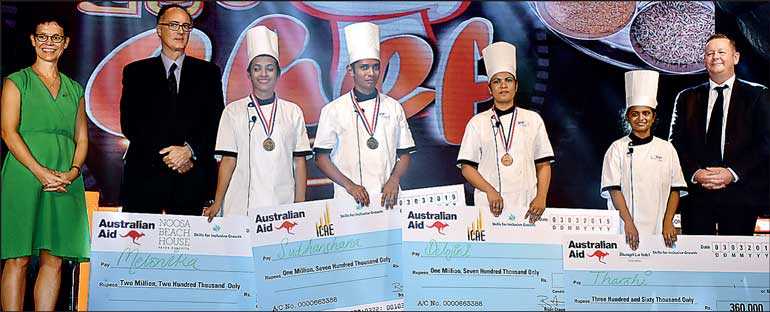Thursday Feb 19, 2026
Thursday Feb 19, 2026
Thursday, 11 April 2019 00:00 - - {{hitsCtrl.values.hits}}

Three deserving, young and passionate amateur cooks from Polonnaruwa and Ampara emerged winners of the recently-concluded ‘Supreme Chef’ reality TV show. They will soon be on their way to Australia for a month-long training program under the guidance of renowned Australian-Sri Lankan Chefs Peter Kuruvita and Jimmy Shu. Upon completion of their training in Australia, they will return home to join Sri Lanka’s growing tourism and hospitality industry.
‘Supreme Chef’ was a program designed and implemented by Skills for Inclusive Growth (S4IG), an initiative of the Australian Government’s aid program in collaboration with the Ministry of Skills Development and Vocational Training. This competition was designed to create opportunities for aspiring chefs and to create a pool of skilled cooks that benefit the hospitality industry by joining the workforce.
Initial auditions for ‘Supreme Chef’ began in August 2018 and saw over 600 entrants enthusiastically joining in from the selected Districts of Trincomalee, Polonnaruwa, Ampara and Batticaloa. Eighty amateur cooks from these districts were selected and then whittled down to 20 over three days of intensive cooking auditions. The top 20 were then invited to Colombo for three weeks of basic kitchen skills training followed by the studio based competition.
Four contestants battled their way through and made it to the much-anticipated finale. Delojini Pushparasa from Ampara, Diana Melonika and Sudarshana Lakmal from Polonnaruwa and Darshini Varatharajan from Trincomalee made it through to the grand finale held in Batticaloa on 3 March. Of them, Melonika emerged the winner, with Sudarshana clinching second place and Delojini third place.
The winner Melonika will receive Executive Chef training at the Sofitel Noosa Pacific Resort in Queensland Australia under the supervision of Master Chef Peter Kuruvita. Runner-ups Sudarshana and Delojini will receive an internship at the International College of Advanced Education (ICEA) in Darwin, an industry leader in training provision for Australia’s hospitality sector. This will also include an internship under the supervision of Chef Jimmy Shu of the Hanuman Restaurant. Incidentally Chef Shu was born and raised in Batticaloa before moving to Australia in his youth.
Darshini, who was placed fourth in the competition, will receive a six-month internship at the Shangri-La hotel in Colombo. Upon their return from training in Australia, the top three contestants will also join Darshini for internships at Shangri-La. The prize includes monthly allowance, accommodation and transport. Contestants eliminated throughout the competition have also been provided ongoing training and mentoring opportunities through industry training providers and work placement opportunities.
Speaking at the Supreme Chef finale, Australian Deputy High Commissioner Victoria Coakley said: “We see tremendous opportunities for men and women in Sri Lanka to gain long term skilled employment in the tourism sector. Tourism is the only economic sector that has performed exceptionally well during the last 10 years and is now placed as the third highest foreign exchange earner in the country. But none of this potential can be realised without the right skills, and this is where we come in with programs like Skills for Inclusive Growth and Supreme Chef, bringing international expertise and industry best practice to support the development of the entire sector.”
Speaking of the competition, Team Leader of Skills for Inclusive Growth, David Ablett said that he was surprised to see such a large number of entries since the first promotional flyers went out for Supreme Chef. This was an indication that many were eager to partake in such a competition that also projects a career path in tourism.
“We realised that there was an acute skills shortage, food quality and safety had become problematic and although there are so many famous indigenous dishes from those areas, not many visitors knew or had ways to try and taste them. There was a lot of cultural taboo that we had to cut through, but we were amazed at the response the show has garnered. The participants themselves have risen to the challenge and have showed eagerness to learn new skills and find employment in the hospitality and tourism sector.”